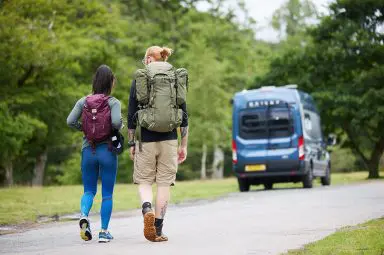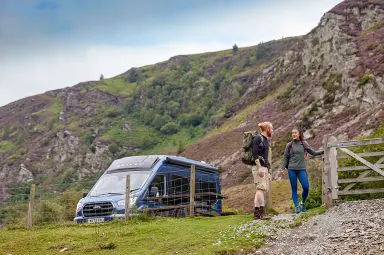Campervan vs. caravan: which should you choose?
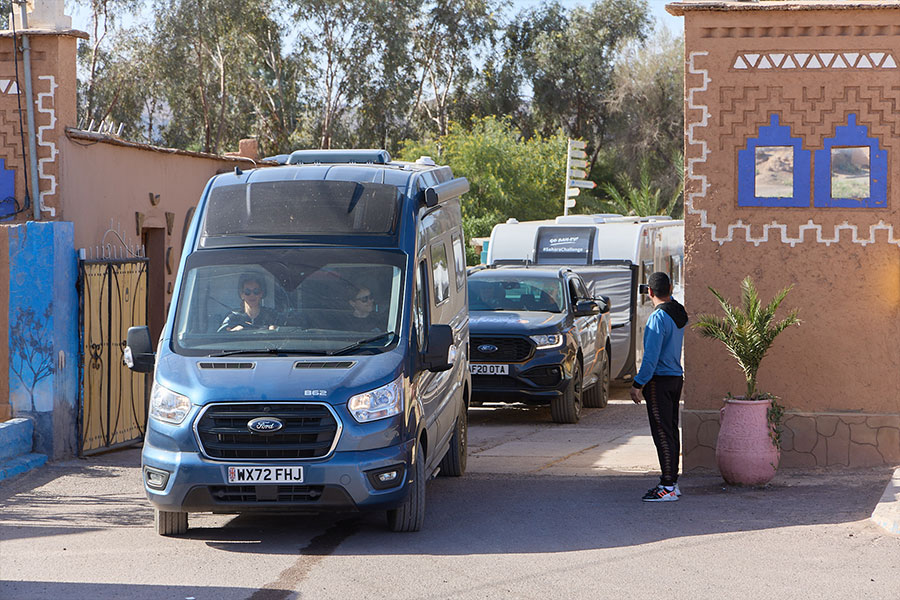
What is the difference between a caravan and a campervan?
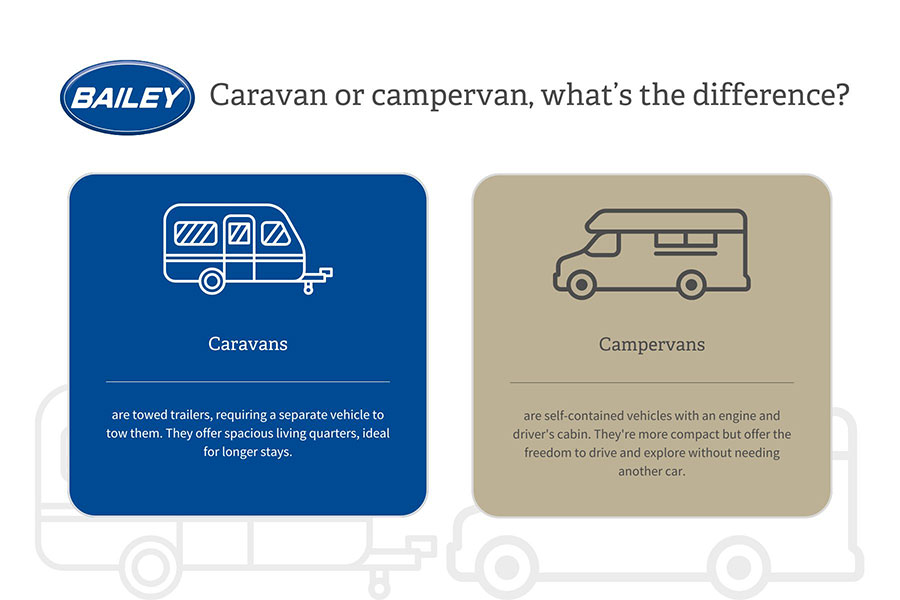
Caravans and campervans are both a way to have a mobile home but with a key distinction.
- Caravans are towed trailers, requiring a separate vehicle to tow them. They offer more spacious living quarters, ideal for longer stays.
- Campervans are self-contained vehicles with an engine and driver’s cabin. They’re more compact but offer the freedom to drive and explore without needing another car.
What campervan or caravan holiday type is each vehicle suited to?
Caravans and campervans are perfect if you’re looking for European or UK holidays that prioritise:
- Freedom and Flexibility: When you holiday in a vehicle, you aren’t tied to one location like staying in a building: you have the freedom to go whenever you want to.
- Nature Connection: Many campsites are in the middle of some of the best scenery the world has to offer. You’ll find options to stay near beaches, in woodlands or in the middle of valleys.
- Budget-friendly travel: They offer a self-contained living space, which means you don’t need to spend money on hotels or B&Bs, and you can save on eating out if you’d like to.
- Outdoor Activities: Many campsites cater to outdoor enthusiasts, with amenities for hiking, biking, and water sports right on your doorstep.
While you can do all the following activities with a caravan or a campervan, here’s some ideas of the types of holidays you might want to consider with each:
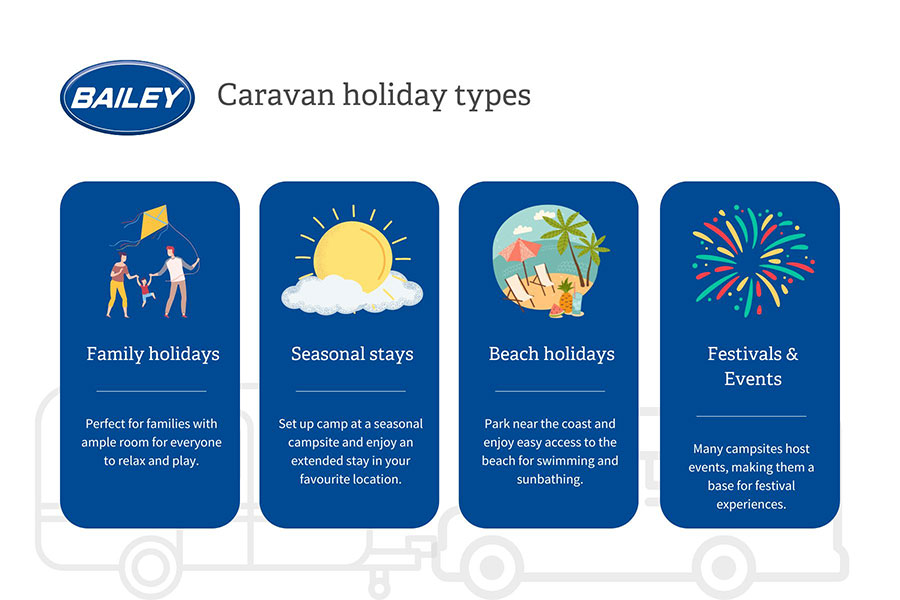
Touring caravans are ideal for…
Family Vacations
Perfect for families with ample room for everyone to relax and play
Seasonal Stays
Set up camp at a seasonal campsite and enjoy an extended stay in your favourite location
Beach Holidays
Park near the coast and enjoy easy access to the beach for swimming and sunbathing
Festivals and Events
Many campsites host events, making them a base for festival experiences
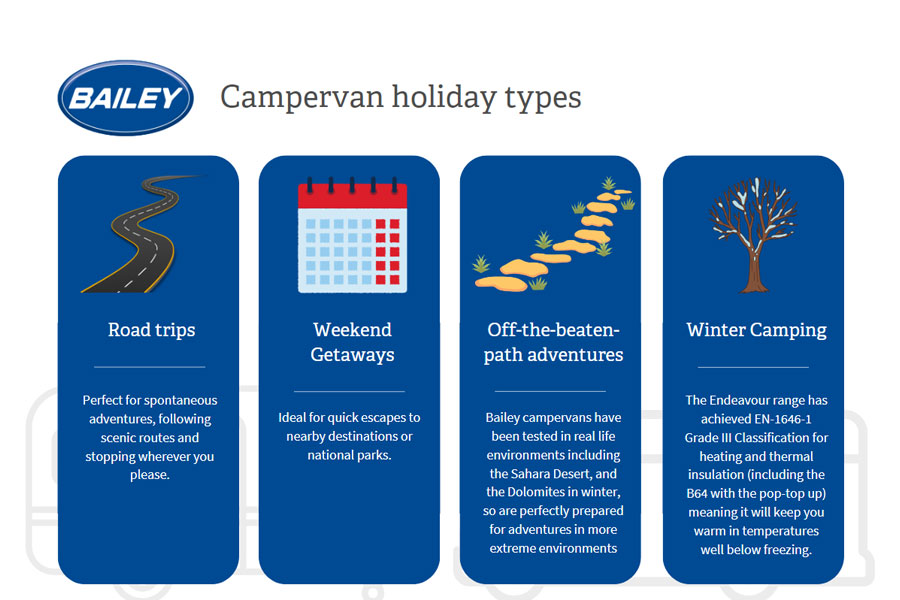
Campervans are ideal for…
Road Trips and Exploration
Perfect for spontaneous adventures, following scenic routes and stopping wherever you please
Weekend Getaways
Ideal for quick escapes to nearby destinations or national parks
Off-The-Beaten-Path Adventures
Bailey campervans have been tested in real life environments including the Sahara Desert, and the Dolomites in winter, so are perfectly prepared for adventures in more extreme environments
Winter Camping
The Endeavour range has achieved EN-1646-1 Grade III Classification for heating and thermal insulation (including the B64 with the pop-top up) meaning it will keep you warm in temperatures well below freezing.
Caravans and Campervans: What driving licence do I need?
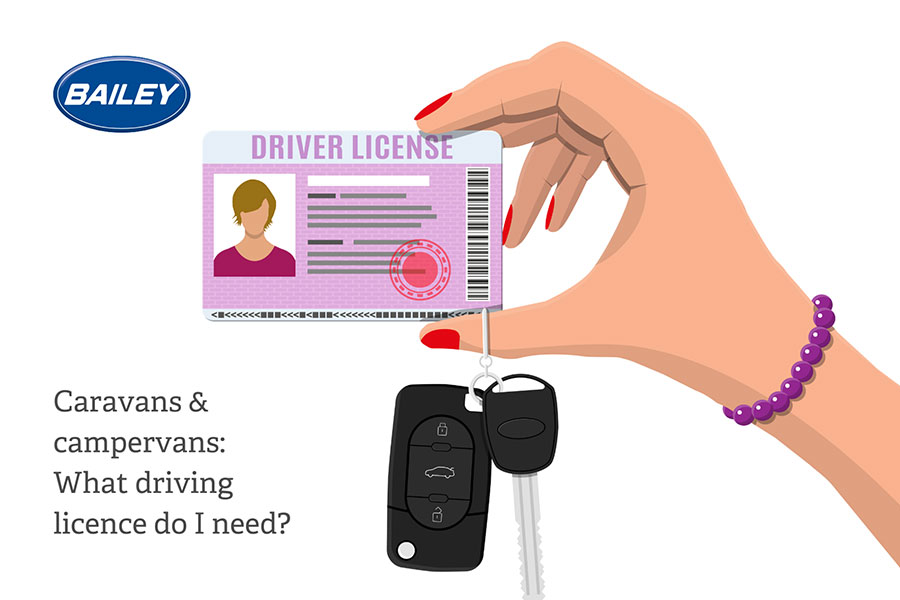
To tow a caravan or drive a campervan in the UK, you’ll need a driving licence with the correct entitlements. What you can drive or tow depends on when you passed your test.
Here’s a breakdown referencing information found on the DVLA website:
Important: Check your own licence to see what entitlements you hold as variations from the below may apply
Standard UK Driving Licence (test passed before 1 Jan 1997)
If you hold this type of licence, you can usually drive a vehicle and trailer with a combined weight of 8250kg MAM. You can also drive a minibus with a trailer over 750kg MAM. (Source – DVLA website)
This generally means that most common caravan and car combinations will be available to you, but always make sure that the car is matched to the caravan and that you don’t go over your weight allowance.
This type of licence also allows you to drive a vehicle with a MAM of up to 7500kg which covers larger campervans and motorhomes.
Over 70
About 3 months before your 70th birthday, the DVLA will send you the standard forms to renew your driving licence for the first time, and you will need to continue to do this every three years from here on. If you want to continue to drive vehicles over 3500kg, you’ll need to ask your doctor to fill in an additional form (often known as a ‘drivers medical’ which you will likely need to pay for as part of a private appointment).
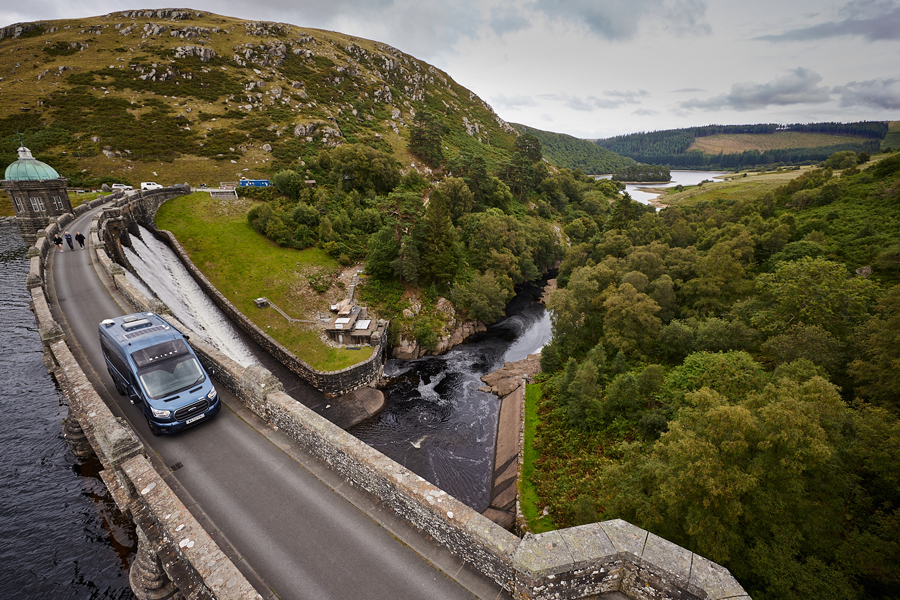
Standard UK Driving Licence (test passed on or after 1st Jan 1997)
If you passed your test on or after 1st Jan 1997, you can now tow a trailer that weighs up to 3500kg due to a change that happened on the 16th December 2021, which allowed drivers who passed after 1st Jan 1997 to tow heavier trailers without having to pass an additional test (Source: DVLA Website).
You’ll still have to match your car to the caravan but it now makes it easier for drivers with this licence to tow heavier caravans such as twin axles.
Unless you have taken any additional tests, you are usually restricted to driving vehicles of 3500kg or below.
After 70
As for drivers who passed before 1st Jan 1997, the standard renewal form will be sent out with a renewal reminder just before your 70th birthday. Any additional categories you have gained on your licence since first passing will need to be renewed separately (and again may require a doctor to complete a medical form) and if you want to add any additional categories you have not held before, a test may be required.
For more detail on this, the Camping and Caravanning Club have an extensive breakdown here and you can also find lots of information and help with driving licences on the DVLA website.
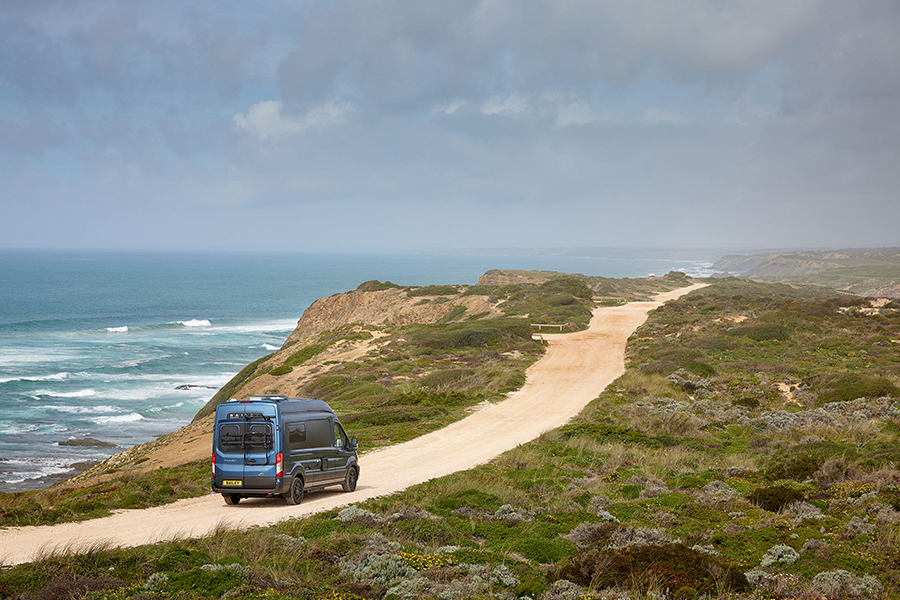
Are caravans cheaper than campervans?
While both caravans and campervans offer unique ways to explore the outdoors, there are different things to think about when considering the costs of each.
It’s not as straightforward as if one is cheaper than the other, but more looking at where your budget might need to go for each type of vehicle.
Initial purchase
Caravans and campervans vary in cost and in both categories, you can find entry level and high end luxury. This means there is a range of choice and you should be able to find something to fit your budget.
However, in general terms, a campervan will be more expensive than a caravan to purchase. You will need to offset this against the cost of the tow vehicle for the caravan though.
If you need to change your car to accommodate the caravan you want, factor this into your calculations for a caravan.
Maintenance
Both a caravan and a campervan will need regular maintenance to keep them running smoothly.
Day to day things like toilet chemicals, loo roll, washing up liquid and petrol or diesel will be needed for both, and you should get them serviced annually, especially if they are under warranty to preserve the terms of the warranty.
- A caravan will need a habitation check plus any work required off the back of this. As before, factor the cost of the service and MOT of your tow car into your calculations.
- Campervans will need a habitation check plus a service of the cab and MOT when it is over 3 years old (just like a car), and again any work required as a result of these checks.
Road Tax
- A caravan doesn’t need road tax but you will have this on your tow car
- A campervan will need road tax and like a car, this can vary on the size of the vehicle and the CO2 emissions.
Investment Opportunity
Both caravans and campervans do tend to hold their value well but this will depend on many things, including the condition of the vehicle, how well its been maintained, its age on selling and the demand in the market.
Of course you’ll want to hold on to as much value as you can in your vehicle – its a big purchase after all! But also try to see the value that you get from the trips you can take, the family holidays and weekends away and the memories made in your leisure vehicle and choose something that will match your family’s needs.
The pros and cons of caravans and campervans
Caravans and campervans are both great options for your holiday plans in the UK and further afield.
We’ll look below at some of the pros and cons of holidaying in a caravan or campervan to give an idea of some of the things you may need to think about when choosing your leisure vehicle and help you to decide if you are more at home in a caravan or a campervan.
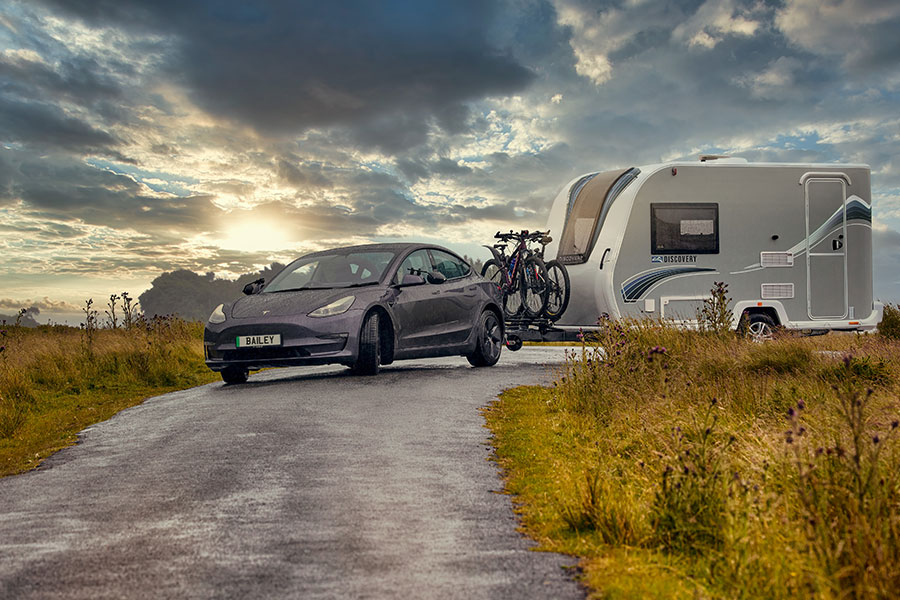
Caravans pros
- Find the space you need for your family. With so many models and layouts available, you will be able to find a caravan that suits your own family set-up, giving you the living space you need to enjoy your holiday
- Wide range of choice. With many different ranges available, all with different features and benefits, you can also find the features that you want to help make family life easy. From separate bedroom space to fridges that open from either side or the perfect place to mount your TV, there will be a layout that will work for you.
- Explore unrestricted. Once you have the caravan parked and set up, you now have the car to explore the surrounding area.
- Winter getaway potential. All Bailey caravans are cold chamber tested to EN-1645-1 Grade III classification to ensure that they can cope with lower temperatures and keep you warm at whatever time of the year you choose to go away.
- Strong community. A large community of caravan owners offering support, advice and shared experiences.
Caravan cons
- You’ll need to be comfortable with towing. You can take a course with either the Caravan and Motorhome Club or the Camping and Caravanning Club to help you learn the basics of towing and get more comfortable with manoeuvring.
- You may potentially need to change your car. Caravans require a tow vehicle that matches their caravan so you will need to be comfortable with the idea of towing and also prepared to potentially change your car to match the caravan that you would like to own.
- Storage. Campervans are often used as a first or second vehicle, but a caravan will need a dedicated space to live while you are not using it. This might be your driveway or a rented space in a storage yard, but you will need to find a safe and dedicated spot.
- Setting up and and taking down. If you want to spend a holiday touring around several places, setting up and packing down may take longer than it would with a campervan.
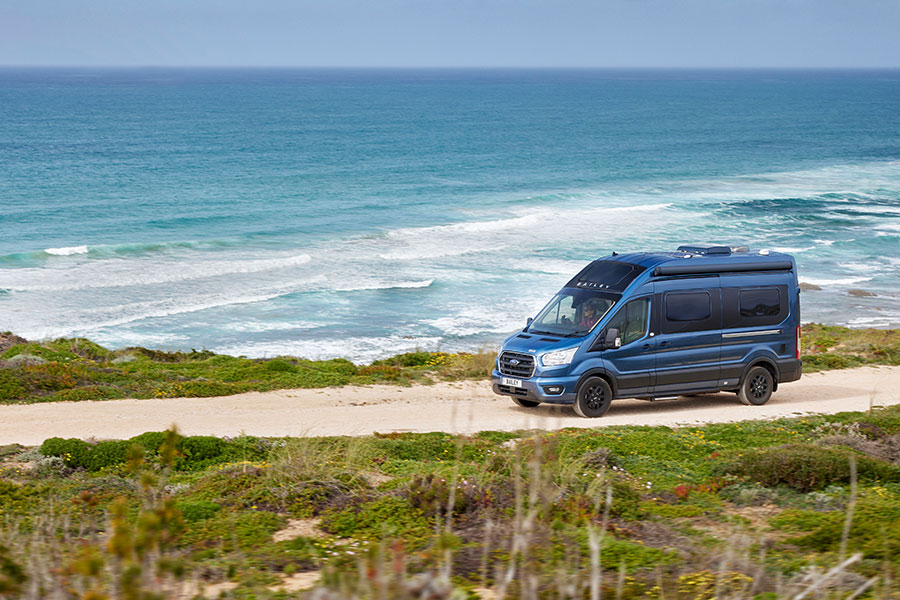
Campervan pros
- Unmatched freedom. The ultimate in holidaying flexibility – a campervan allows you to easily pack up and explore anywhere at ease, stopping off wherever you would like on a whim.
- Driving simplicity. If you’ve driven a car then you can drive a campervan of up to 3500kg (or more depending on your licence – see above). Campervans are also more compact than other larger vehicles, meaning that its not as much of a jump from a standard car, and you may find them easier-to-drive than you first thought.
- Multipurpose use. Many people use their campervan as their daily vehicle, meaning you can get more use from it when you are not holidaying. Campervans are also great for collecting bulky items, grocery shopping and the odd day trip. You can even use them as a spare room at home, a way to get extra living space, and make travelling to visit friends and family a breeze.
- As with caravans, Bailey motorhomes are tested to EN-1645-1 Grade III classification , meaning that they will keep you warm all year round so you can continue to travel and adventure whatever the weather.
Campervan cons
- Initial cost. Campervans are usually more expensive to buy but if you are choosing between a caravan and a campervan and cost is a primary concern, consider the running costs of your current car and potentially the cost to change it if you need a different tow car for a caravan. This will help to give you a clearer picture.
- Living space. Campervans do have a more compact living area. For couples or singles this may be less of an issue, but if you have a larger family, think about if the living space will work practically for you.
- Storage. Whether you are using your campervan as a daily vehicle or if you now have two vehicles to store including your day to day car, you’ll need to have enough space for them both. This may mean finding space at home on the driveway or on the road, or looking into dedicated storage for your campervan.
- Finding parking: When you are out and about in your campervan you might need to put more consideration into where you find parking. Watch out for height restrictions and smaller parking spaces. If you are planning on touring with your campervan you can find some of the best places to park ahead of time so you know which parking space to head to on your travels.
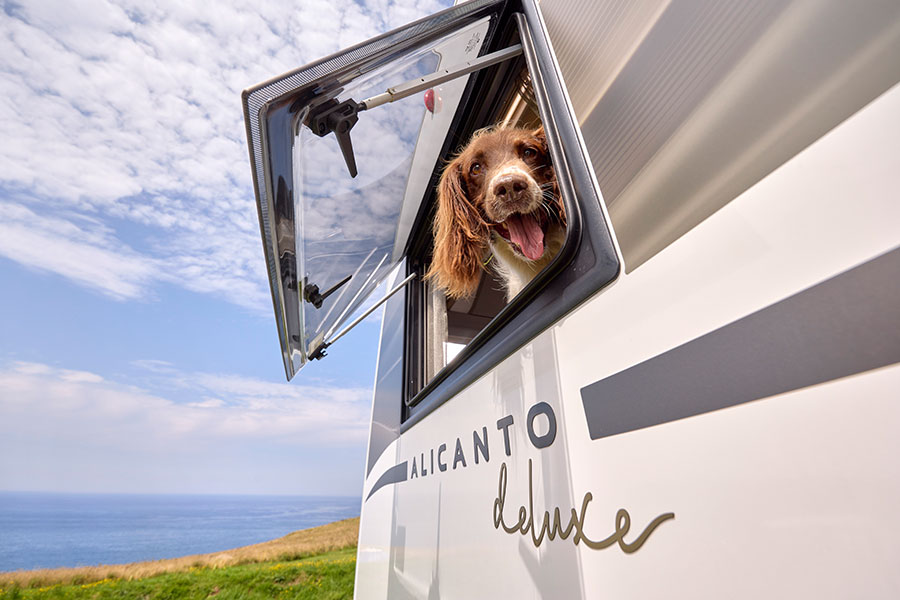
The top questions to ask yourself when deciding: campervan or caravan?
1,. Travel style – campsite vs touring: Do you prefer a longer stay in one place with amenities or the freedom to move easily around lots of different locations without having to pack up camp multiple times?
A caravan is great for providing a longer term base with a car available for day trips whether you are on a UK holiday or a trip abroad, and a campervan can be fantastic for staying on the move day after day to cover a wider area.
2. Number of travellers: How many people will be joining you? And how much space do you need?
Campervans can normally sleep around 4 people but space is at a premium as a compromise for easy of travel. Caravans have more space in general and often come with separate bedrooms and the ability to add awning tents to create even more space.
3. To tow or not to tow?: Are you comfortable towing a caravan or would you prefer to drive a campervan?
This is personal preference but an important thing to consider. Both the Caravan and Motorhome Club and the Camping and Caravanning Club offer training courses on towing if you have never done it before.
4. Budget: This will be different for everyone, but consider things like the initial cost, fuel, maintenance expenses and any equipment you might need to purchase.
You might need to factor in changing your tow vehicle, storage costs, campsite fees and any courses you might like to take to acclimatise yourself to the vehicle.
5. Storage: Do you have dedicated space for the vehicle you want, or will you need to find somewhere to store it away from home? Other than cost, consider factors like distance and ease of access to the site.
Where can I see the latest caravans and campervans?
Now that you’ve explored the world of caravans and campervans, it’s time to decide which adventure awaits. We’ve got a fantastic selection of both to suit any travel style and budget.
Interested in caravans?
You can view our caravan ranges here. Our caravans offer spacious living, perfect for families or longer stays. Relax at campsites with all the amenities and enjoy the freedom of exploring the area with your car on your caravan holiday.
Looking for a campervan?
View our campervan range here. Our Endeavour campervans provide the ultimate flexibility and self-contained travel. Hit the open road, stop whenever your heart desires and experience the thrill of adventure.
See us in person
If you want to see Bailey caravans and campervans in person (as well as coachbuilt motorhomes!) you can find your local Bailey Approved Retailer here. Alternatively, keep your eye on our News and Events section to see events coming up at Retailers and larger showgrounds throughout the year. Or you can visit the Bailey stand at the NEC leisure vehicle shows which are held twice yearly in February and October.
Latest news & events
See all news & eventsChipping Sodbury Spring Sales Event
BADMINTON ROAD, CHIPPING SODBURY, BRISTOL
West Country Motorhomes Open Weekend
BRISTOL ROAD, BRENT KNOLL, HIGHBRIDGE, SOMERSET
Swindon, Oxford and Reading Caravan and Motorhome Centre Easter Sales Event
GREATFIELD, ROYAL WOOTTON BASSETT, WILTSHIRE
Grantham's Midlands Caravan & Motorhome Season Ready Show
SPITTLEGATE LEVEL
GRANTHAM
